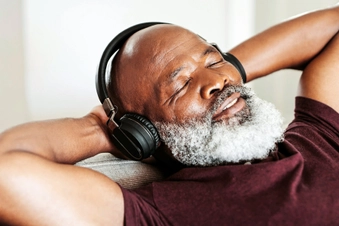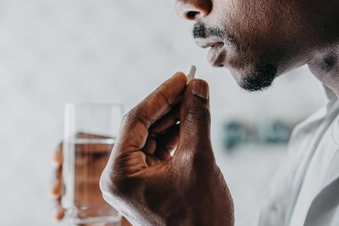Mental Health with Advanced Prostate Cancer: Tips for Black Men and Men of Color

Greater Disease Impact
If you’re a Black male, you’re 70% more likely to get prostate cancer in your lifetime than other men. Living with advanced prostate cancer comes with emotional challenges. These tips can help you boost your mental health as you manage your disease.

Learn More
Sometimes just understanding more about advanced prostate cancer can take some of the fear and uncertainty out of your diagnosis. Ask your doctor for the best sources for facts and statistics. Study up so you feel empowered about your decisions and outlook.

Seek Out Support
An in-person or online prostate cancer support group is a great way to find others who understand the unique challenges of your disease. It can be even more helpful if you can connect with other people of color with prostate cancer. ZERO Prostate Cancer’s Black Men’s Prostate Care Initiative provides fully remote group options for education, support, and connection.

Involve Loved Ones
Community stigma around mental health can sometimes get in the way of reaching out to others. But when you have a few trusted friends and family members to share your hopes and fears with, it can relieve some of your mental and emotional burden. Try to open up to those who can sit with you as you process.

Consider One-on-One Counseling
If you feel uncomfortable sharing feelings in a group setting, individual sessions can be a great option. A trained counselor or therapist can help you understand your feelings and reactions and provide a safe place to talk about your worries.

Find the Right Medical Team
The Black community faces greater obstacles to cancer prevention, detection, treatment, and survival. When you’re unheard by your health care team or feel as though they aren’t treating you in a culturally sensitive way, it adds to mental and emotional distress. Find a clinic that best addresses your needs and listens to your concerns.

Feel Your Feelings
An advanced cancer diagnosis is a serious stressor. You don't have to be upbeat all the time or pretend to be cheerful. Do what feels right to you. However, if your feelings of sadness and distress are greatly interfering with your daily life and rarely lift, talk to your doctor.

Relieve Stress
Relaxation exercises such as deep breathing methods, mindfulness meditation, yoga, and tai chi can lower the stress response in your body, so you’re better able to cope with the range of emotions you’re feeling.

Do Things You Enjoy
Continue to carve out time in your life for the hobbies, people, and pursuits that bring you fulfillment. Time in nature, creative activities such as art or music making, and community involvement are all common sources of peace and meaning.

Ask About Medication
Studies show 25% of Black people with prostate cancer report symptoms of clinical depression. The combination of antidepressants and counseling is one of the most effective treatments for depression. Ask your doctor about the treatment best for you.
Show Sources
IMAGES PROVIDED BY:
- Westend61/Getty Images
- Science Photo Library/Getty Images
- E+/Getty Images
- iStock/Getty Images
- E+/Getty Images
- Stone/Getty Images
- E+/Getty Images
- DigitalVision/Getty Images
- E+/Getty Images
- E+/Getty Images
SOURCES:
Memorial Sloan Kettering Cancer Center: “3 Things Black Men Should Know about Prostate Cancer.”
UCSF Health: “Guide to Coping with Prostate Cancer.”
ZERO Prostate Cancer: “Black Men’s Prostate Cancer Initiative.”
Cancer.Net: “Counseling.”
American Cancer Society: “Cancer Disparities in the Black Community.”
National Cancer Institute: “Coping with Your Feelings during Advanced Cancer.”
Oncology Nurse Advisor: “Depression Common After Prostate Cancer Diagnosis, Incidence Higher in Black Men.”
UpToDate: “Patient education: Depression treatment options for adults (Beyond the Basics).”